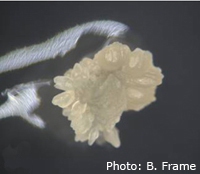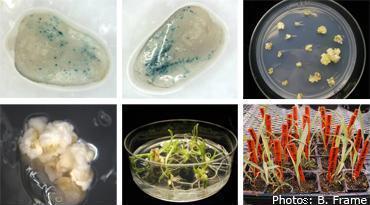Research:
Establishing an Agrobacterium-mediated transformation system for maize inbred lines

A: Type I tissue culture response from B104 inbred line
Agrobacterium tumefaciens-mediated transformation is considered the preferred method for plant genetic transformation due to its ability of generating large numbers of independent events with single or relatively low transgene copy numbers. For maize, this method has been successfully used for transforming a tissue culture amenable hybrid germplasm, Hi II, and a limited number of non-elite inbred lines such as A188 and H99. These germplasms, however, are not desirable for many tailored genetic/genomic studies and crop improvement due to genetic segregation of a hybrid and their inferior agronomic performances. Our research efforts have been focused on identifying a tissue culture media regime to optimize standard binary vector Agrobacterium-mediated stable transformation of immature zygotic embryos for public maize inbred lines.



